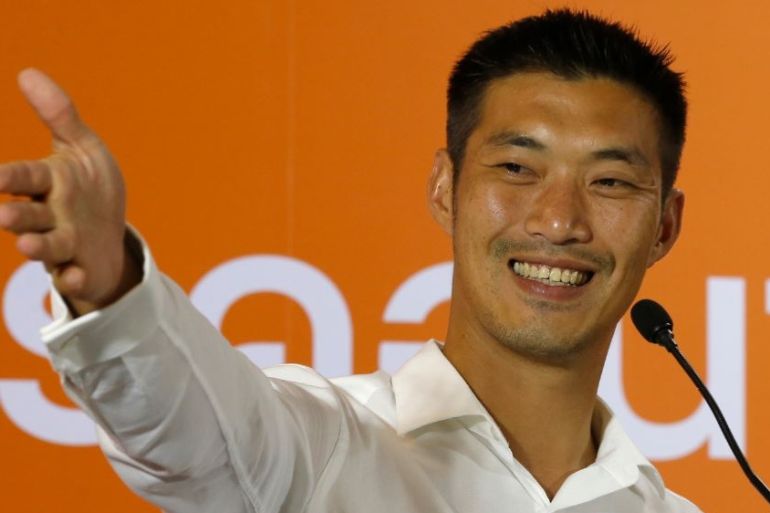Thailand’s Thanathorn unfazed despite series of legal challenges
Speaking to Al Jazeera, Future Forward Party leader says the government raises threat of legal action to pressure him.

Bangkok, Thailand – Minutes after Thanathorn Juangroongruangkit, the leader of the Future Forward Party (FFP), was sworn in on Saturday, he was ordered out following a court decision blocking him from taking his seat in Thailand’s newly formed parliament.
“We anticipated this already,” Thanathorn told Al Jazeera on Wednesday. “We believe it is politically motivated and there’s nothing wrong about what I have done,” he said.
The 40-year-old, a car parts billionaire, is accused by Thailand‘s Election Commission of violating electoral law by holding shares in a media company. The Constitutional Court on Thursday decided to accept the commission’s petition and had his parliamentary duties suspended while it considers the allegations.
The parliamentary suspension is just the latest legal challenge faced by the charismatic, pro-democracy politician, whose recently formed party stunned observers by securing more than six million votes to come third and win 80 parliamentary seats in elections in March.
Thanathorn is also waiting to see whether he will be indicted for computer crime after criticising the ruling military government during a speech he posted on Facebook last year. The decision was delayed for the third time on Tuesday and is now expected on June 28.
Speaking from his party’s headquarters in the capital, Bangkok, he said:
“When they want something from me, they might use this card”.
|
|
On March 24, Thailand held its first election since the military seized power in 2014, the second coup in the last decade and the third time that populist politician Thaksin Shinawatra or his political allies were removed from power after winning a democratic election.
The polls were supposed to usher in a new period of democratic stability, but instead, seem to have solidified military rule.
The military government’s coalition looks set to take control, with General Prayuth Chan-ocha, the current prime minister, retaining power. The results were marred by widespread reports of irregularities and a controversial election formula.
Thanathorn cited a recent by-election in the city of Chiang Mai where the FFP won by a massive landslide but saw two pro-military parties also being rewarded one seat apiece despite securing far less of the vote.
“This is a coup d’etat in a sense,” Thanathorn said, claiming a fair formula would have given the anti-military coalition a majority in parliament.
While Thaksin has lived abroad for years to avoid legal charges of his own, Thanathorn said he would not flee.
“The attempt to stop me from what I am doing today is real, it’s tangible,” Thanathorn said, adding he was not sure if the latest challenge would end with him being banned from parliament, arrested or even his entire party dissolved.
|
|
“Thanathorn has become a great threat to the power position of the elites,” said Pavin Chachavalpongpun, an associate professor at Kyoto University’s Centre for Southeast Asian Studies.
“Unlike Thaksin, Thanathorn will not compromise.”
While Pheu Thai, Thaksin’s proxy party, won the most seats in the recent polls, ahead of the military-backed Phalang Pracharat party and the FFP, Thanathorn’s emergence posed a new challenge to the establishment.
“So far, all the agendas of the FFP have targeted the political position of the establishment of which the monarchy is a part,” Pavin said. “These agendas have never been raised before by other parties, including the elimination of the military’s legacies in politics”.
Paul Chambers, a lecturer at Thailand’s Naresuan University, agreed.
“Vested interests have succeeded in vilifying and turning Thaksin into a bogeyman for urban, middle-class Thais,” he said. “Thanathorn is young, new, vivacious and a threat to that urban middle-class vote which vested interests had assumed was already conservative. Thanathorn is now a greater threat than Thaksin.”
Thanathorn, who launched the FFP a year ago, said initially the military did not take his party seriously, but things changed after its strong showing at the polls where it came third.
“They’re afraid when people stand up when people are ready to take risks in order to take the power back,” he said.
But with the military now seemingly having a solid grip on Thailand’s political scene, the path forward for the FFP appears murky.
“They are playing a game under the junta’s rule,” Pavin said, recommending that the FFP be content for now with their role as a traditional opposition party.
“Should it become politically strong as a government, it will be removed in a coup,” he warned.
Chambers said it was important for the FFP to build on what they had achieved.
“Thanathorn and the FFP must maintain popularity with the people through to the next election and beyond,” he said. “That will at least democratically pressure Thailand’s aristocracy/military establishment.”
For his part, Thanathorn seemed happy to bide his time.
“To get rid of the military peacefully, to restore democracy back in this country is going to take five years, a decade maybe,” he said, adding that for now, his party would continue grassroots activism to win the hearts and minds of Thais while pushing progressive agendas in parliament.